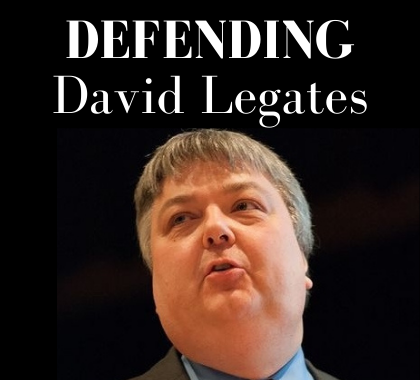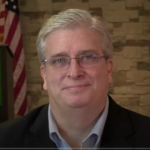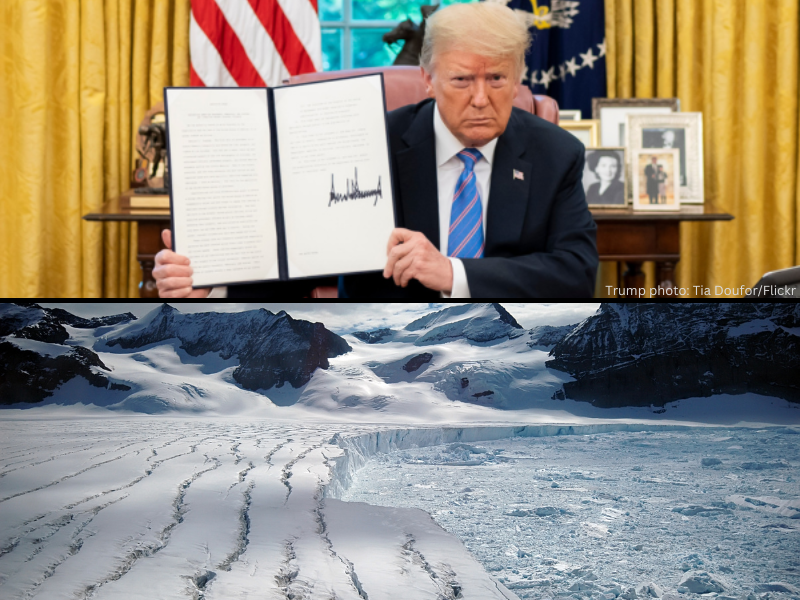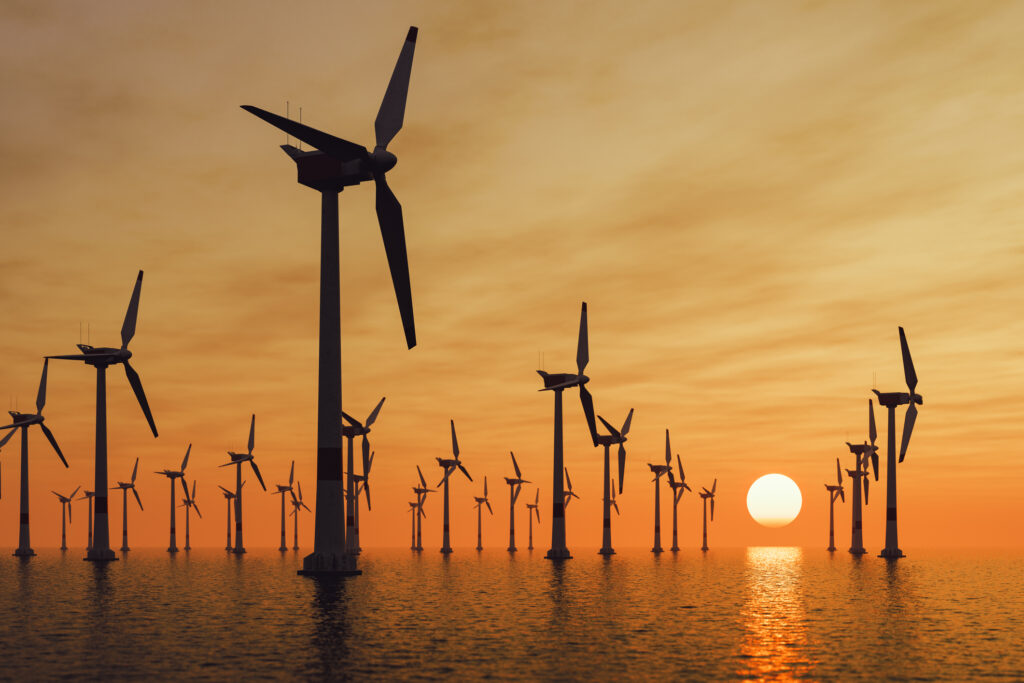Editor’s Note: Award-winning climate scientist David Legates, Ph.D., a professor of climatology in the Department of Geography at the University of Delaware and an adjunct professor at the university’s Physical Ocean Science and Engineering Program and in the Department of Applied Economics, was recently chosen to serve as deputy assistant secretary of commerce for observation and prediction in the National Oceanic and Atmospheric Administration.
Legates, who has written or coauthored more than 125 papers published in peer-reviewed journals, conference proceedings, and monograph series, formerly served as the state climatologist for Delaware and as a visiting research scientist at the National Climate Data Center.
Legates’ appointment to NOAA represents a big win for climate realism, meriting recognition. This week’s guest essay is excerpted from Heartland Institute Vice President Jim Lakely’s rebuttal to National Public Radio’s hit-piece on the appointment. The full post can be found on The Heartland Institute’s website, and I recommend reading it in full online. Lakely refers to dozens of papers in his post, so instead of providing links to each article under “Sources” below as is our usual practice, I have retained the live links in the essay, with Lakely’s original post as the only source listed below.
It’s not often I read a mainstream media report and think every single paragraph is full of cow manure. But this NPR story about Heartland friend and esteemed climate scientist David Legates has falsehoods in every single paragraph that doesn’t merely identify him. Well done, NPR. Their news department reached out to Heartland for comment on a Saturday two hours before they published this story “on a tight deadline,” for a story they were obviously working on for days. Your tax dollars subsidize this fake news!
Below I debunk some of the lies the story tells about Legates, climate science, the scientific method, and The Heartland Institute. Buckle up.
“David Legates, a University of Delaware professor of climatology who has spent much of his career questioning basic tenets of climate science, has been hired for a top position at the National Oceanic and Atmospheric Administration,” states NPR’s lead paragraph.
Legates has, indeed, been “questioning basic tenets of climate science,” if you replace the word “science” with “dogma.” The very definition of science, in its most basic sense from the Enlightenment to today, is “questioning the basic tenets” of current assumptions. Is taxpayer-supported NPR reporter Rebecca Hersher ignorant of this basic fact of the scientific method and how progress in science proceeds?
In the fourth paragraph, Hersher writes, “Legates has a long history of using his position as an academic scientist to publicly cast doubt on climate science. His appointment to NOAA comes as Americans face profound threats stoked by climate change, from the vast, deadly wildfires in the West to an unusually active hurricane season in the South and East.”
David has not “used his position” for anything. He has done his duty as a scientist by examining the data for decades and has not seen proof humans are the chief drivers of climate change. Americans in the West threatened by wildfires have the extreme never-cut-any-tree-down “green” polices pushed by the Sierra Club and other luxuriously funded leftist groups to blame for their misery. BTW, this year’s hurricane season is indeed active, but that is only getting back to normal after almost historic years of inactivity. The legacy media ignores these facts because “disaster” sells, even if you have to make it up.
“Global temperatures have already risen nearly 2 degrees Fahrenheit as a result of greenhouse gas emissions from burning fossil fuels,” says Hersher.
Ok. “nearly 2 degrees Fahrenheit” … since when? The climate science reporter doesn’t say. Shouldn’t there be some basic context for that statement? Nor does NPR present any proof the temperature rise is a result of human greenhouse gas emissions.
The Earth is warmer than it was before the dawn of the Industrial Revolution, when humans started burning fossil fuels and emitting carbon dioxide in the atmosphere. But global temperatures were as high or higher than at present several times since the end of the last ice age, when global emissions were a tiny fraction of today’s, a fact Legates has repeatedly pointed out as a researcher devoted to the scientific method, which involves finding and publicizing the truth.
In paragraph six, Hersher writes, “In 2007, Legates was one of the authors of a paper that questioned previous findings about the role of climate change in destroying the habitat of polar bears,” and, “That research was partially funded by grants from Koch Industries, the lobbying group the American Petroleum Institute and ExxonMobil….”
This wasn’t just “a paper”; it was a peer-reviewed paper in the journal Ecological Complexity. Funny how NPR, pushing an agenda, fails to mention that very important fact. Legates didn’t just “write a paper” that “someone” published; he coauthored a peer-reviewed paper with six other noted climate researchers. NPR’s characterization is a joke. As it happens, data shows polar bear populations are thriving, another easily found fact that debunks the claim bears’ habitat is being destroyed. NPR makes no attempt to counter the paper, just a smear.
“The same year, Delaware Gov. Ruth Ann Minner sent a letter to Legates expressing concern about his opinions on climate change, given that he was the state climatologist at the time,” writes Hersher in the seventh paragraph. “Minner asked him to refrain from casting doubt on climate science when he was acting in his official role. Legates stepped down in 2011.”
A politician definitely knows more about climate science than Legates. Sure. And again, Legates wasn’t “casting doubt on climate science”; he was engaging in climate science. His sin was that his examination of the data differed from climate politics dogma.
Here is NPR’s paragraph nine:
“Legates is a professor in the Department of Geography and Spatial Sciences at the University of Delaware. He is also affiliated with the Heartland Institute, a think tank that has poured money into convincing Americans that climate change is not happening and that the scientific evidence—including evidence published by the agency that now employs Legates—is uncertain or untrustworthy.”
That is 100 percent false. If Hersher had spent even 10 minutes looking over Heartland’s website, our Center on the Environment, our climate conferences, the Climate Change Reconsidered series, our Climate Realism site, or our Climate-at-a-Glance site, she would know Heartland has never posited “climate change is not happening.” Such a proposition is absurd.
The point The Heartland Institute raises—via the hundreds of scientists we work with across the globe—is that human activity is not the main driver of climate change. That is what the data shows, including NOAA’s. They just don’t like to admit it.
The tenth paragraph in NPR’s article says, “Advocates who reject mainstream climate science, such as those at Heartland, have had a leading role in shaping the Trump administration’s response to global warming, including the decision to exit the Paris climate accord.”
Eureka! We’re making progress. The Heartland Institute did have a role in Trump rejecting the Paris Climate Accord and has helped shape his “response to global warming.” We are proud of this, and every American should be grateful. For once, every word of this paragraph is an accurate statement, other than the “reject mainstream climate science” mantra.
I know the ignorant media like to trot out the idea of “mainstream” or “consensus” climate science, but consensus is a political notion, not a scientific one, and it conflicts directly with the scientific method. In a one-minute presentation, Nobel Prize-winning physicist Richard Feynman states the universal law of the scientific method clearly and distinctly.
Buried way down in paragraph 11, Hersher finally quotes someone who understands how science is supposed to work and who recognizes the importance of Legates’ appointment to NOAA.
“Steve Milloy, a Heartland board member and part of Trump’s Environmental Protection Agency transition team, says he welcomes the Legates appointment. ‘David Legates is a true climate scientist and will bring a great deal of much-needed science to NOAA,’ Milloy writes in an email to NPR,” reports Hersher.
But then it’s back to the smear campaign. In paragraph 14, Hersher writes, “Over the last 20 years, in his work and public statements, Legates has rejected the overwhelming peer-reviewed research that shows human activity is the main driver of a dangerously changing climate.”
Legates has not “rejected the overwhelming peer-reviewed research that shows human activity is the main driver of a dangerously changing climate”. Instead, he has examined the same data and come to a different conclusion. That is science. And Legates has defended his conclusions in public, repeatedly, for many years. Unfortunately, the only coverage Legates and other scientists in the climate realist camp get for their discoveries from NPR and other corrupt, incurious mainstream media outlets is the kind of crap contained in this article. This serves neither their listeners/readers nor science itself.
The Heartland Institute is hosting its 14th International Conference on Climate Change in April in Las Vegas. Hersher should attend the event. If she listens with an open mind, she might learn something, and if she reports from the event accurately and without bias, so might her listeners.
— Guest essayist Jim Lakely ([email protected]) is vice president and director of communications at The Heartland Institute.
SOURCE: The Heartland Institute
IN THIS ISSUE …
EUROPEAN GREEN NEW DEAL WILL SINK THE EU ECONOMY … GREEN ENERGY PUSH THREATENS BIODIVERSITY
EUROPEAN GREEN NEW DEAL WILL SINK THE EU ECONOMY
The European Commission (EC), has proposed a European version of the Green New Deal (EGND) to produce net-zero carbon dioxide emissions by 2050. The Heritage Foundation analyzed EGND and found the plan, like the U.S. version before it, would require huge, centralized intervention in the economy, carry high costs, and limit consumer choice, and it will prevent almost no future temperature increases. To decouple economic growth from resource use while restoring biodiversity, cutting greenhouse gas emissions, and ensuring a just and inclusive transition to carbon neutrality by 2050, as the EGND requires, the EC proposes imposing this, Heritage notes:
“[A] ‘European Climate Law’ that would convert political commitments on climate ‘into a legal obligation and a trigger for investment’ by mandating ‘action by all sectors of [the EU’s] economy,’ including: Giving subsidies for what policymakers determine to be environmentally friendly technologies; setting renewable energy targets and energy-efficiency targets; committing government spending on alternative fuels and public transport; and imposing new regulations to decarbonize the energy sector.”
All of this, Heritage notes, would necessarily translate into more central planning from Brussels, where the EC would determine what types of energy Europeans produce and consume and would intrude into average peoples’ daily lives by limiting their travel and restricting how they manufacture goods and produce food.
Heritage finds the EGND would cause a drastic decline in the European economy, with an overall average loss of more than 1.1 million jobs annually from 2020 through 2040; a total income loss of more than $165,000 per family of four; and an aggregate gross domestic product loss of more than $15 trillion, in part resulting from increases in household electricity expenditures topping 30 percent.
These economic sacrifices would be in vain vis a vis any impact on climate, Heritage finds. Even if the EU reduced its carbon dioxide emissions by 100 percent by 2030, it would avert only 0.046 degrees Celsius of warming by 2050 and 0.120 degrees Celsius of warming by 2100.
SOURCE: The Heritage Foundation
GREEN ENERGY PUSH THREATENS BIODIVERSITY
In April 2020, The Heartland Institute released a report, “How the Green New Deal’s
Renewable Energy Mining Would Harm Humans and the Environment,” detailing the tremendous environmental harms resulting from the push to expand solar and wind power for electricity, driven by the political imperative to reduce carbon dioxide emissions to fight climate change. The author, Paul Driessen, describes myriad environmental harms such as toxic waste created in the mining of rare earth minerals needed for green energy technologies, and habitat disruption from the mines themselves.
A new paper in Nature Communication from a team of Australian researchers expands on Driessen’s findings. In particular, their research indicates mining for the minerals and metals necessary to construct and operate solar panels, wind turbines, and batteries threatens biodiversity because the most likely sites for those mines—where such minerals and metals are concentrated—are in or near biodiversity hotspots. In particular, many existing and potential mine sites are next to, near, or within areas currently protected by national governments for parks, wilderness, and wildlife (8 percent); biodiversity hotspots (7 percent); or wilderness areas not currently disturbed by human development (16 percent). As existing mines in these areas expand or new mines are opened to meet the politically stoked demand for renewable energy, biodiversity will likely decline.
“Increasing the extent and density of mining areas will obviously cause additional threats to biodiversity, and our analysis reveals that a greater proportion of mines targeting materials for renewable energy production may further exacerbate threats to biodiversity in some areas,” the scientists conclude.
This should lay to rest the myth that renewable energy is green or environmentally friendly.
SOURCES: Climate Change Dispatch; Nature Communications






